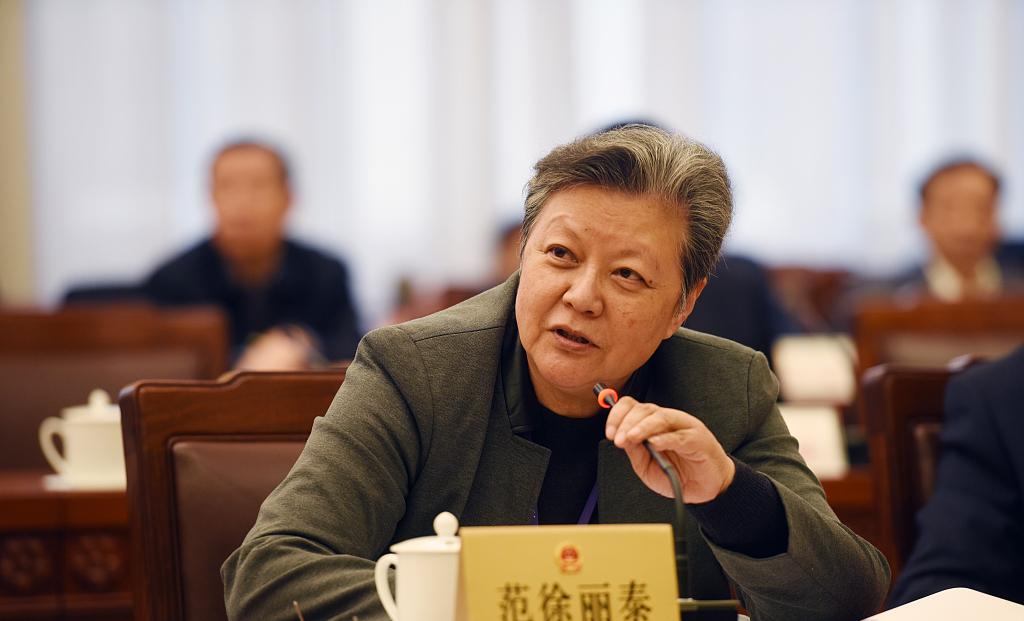Source: Global Times - Global Network
Former Hong Kong Legislative Council President Fan Xulitai said in an exclusive interview with a Global Times reporter on the 10th that the Western claim that the reform of Hong Kong's election system will reduce the Legislative Council and other institutions to "rubber stamps" is completely groundless. The election reform will not make Hong Kong lose its voice of criticism, but the criticism should be directed at the policy itself, not against the regime. She said more bluntly that Hong Kong people's criticism of the Chinese Communist Party needs to have a factual basis and cannot spread rumors and smears, "If you want to use the land of Hong Kong's bullets to overthrow the ruling party of the 1.4 billion people in Chinese mainland, one is that you are not measuring up to your strength, and the other is that it is absolutely impossible." ”
On the afternoon of March 11, the Fourth Session of the 13th National People's Congress voted to adopt the Decision of the National People's Congress on Improving the Election System of the Hong Kong Special Administrative Region. During the brewing period of hong Kong's electoral system reform, there have been public opinion in the West and even in Hong Kong that this election reform will make Hong Kong lose its characteristics of political pluralism, and will also make the Legislative Council and other institutions completely degenerate into "rubber stamps" or "loyalty waste". In this regard, Fan Xulitai did not agree, she said that this is a complete misreading, so that anti-China chaos Hong Kong elements out, does not mean that there are no different voices.

Fan XuLitai Image source: People's Vision
In fact, in the Legislative Council, many people known as the "establishment" often criticize the government for not doing enough or opposing a certain policy, she said. It is only because of the so-called "opposition" that they are artificially classified as "establishments". "It is perfectly acceptable to oppose only policy, not the regime itself."
In her attitude toward the Chinese Communist Party, she reminded some Hong Kong people that criticism of any ruling party and what it does needs to have a factual basis. The purpose of criticism should also be to push it to do better. Criticism with this purpose in mind is acceptable in any country.
"But if you want to use the land of Hong Kong to overthrow the ruling party of Chinese mainland 1.4 billion people, one is that you can't measure up to your own strength, and the other is that it is absolutely impossible." Overthrow the Communist Party, who will govern? Do you have this ability yourself? Of course not. Without this ability, are you doing this to collect money from others? You ask yourself again, are you doing something meaningful and positive? She asked rhetorically.
Fan Xulitai told reporters that no matter what, the central authorities and the SAR will not stop the reform process because of Western opposition. Both the Sino-British Joint Declaration and the Basic Law of that year also made it very clear that the central authorities have the right to create the Hong Kong Special Administrative Region and the right to decide on the sar system, not to mention that "the Sino-British Joint Declaration is not an agreement, but only a statement." ”
The first president of the Legislative Council after Hong Kong's return to the motherland lamented that in recent years, the Hong Kong Legislative Council has completely lost its professionalism, deviated from the original intention of "one country, two systems," and deviated from the original meaning of the original legislation of the Basic Law. "Like a train off track," she described, "our original goal was to ensure Hong Kong's prosperity and stability, but now some of the parliamentarians we elect are undermining Hong Kong's prosperity and stability." ”
"What exactly is democracy?" She asked some voices who questioned the "backwards of democracy" in Hong Kong due to election reform, saying, "Democracy is that if there are different opinions, everyone can discuss." Even if you listen to my opinion and don't like it, you can turn around and go. But you can't hit me, you can't burn me. However, the half-year-long riots in 2019 not only clearly violated this value, but also put Hong Kong on the verge of collapse of social order.
"We want the power of democracy to develop in Hong Kong, but the power of democracy is not a force of destruction." So, people who don't understand this issue and are calling democracy all day long, I want them to pause and think, are you worth sacrificing yourself for the hegemony of the West? She said.
Not long ago, Fan Xulitai said in an interview with the media that the "two systems" in "one country, two systems" is said to be the economic system, that is, the system of financial openness, rather than the political system. This formulation has subsequently sparked much discussion in Hong Kong, and some commentators have argued that this statement is debatable because capitalism does not refer only to the economic system, and Hong Kong's political system and power structure are completely different from those in the mainland.
In the interview, she further explained to the reporter that due to the limited time of the interview, she could not elaborate on this point of view, so it caused a certain misunderstanding. What she actually wants to express is that Hong Kong is highly autonomous in terms of economy, not only implementing a capitalist economic system different from that of the mainland, but also an independent financial center, and can join various international economic organizations as an independent member. In the political field, the situation is very different, the National People's Congress has the final say in deciding on the method of electing the chief executive, and the final decision on political reform has always been in the central government.